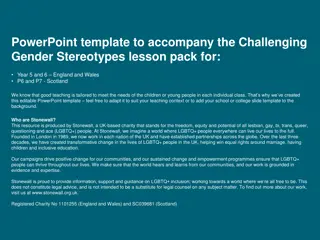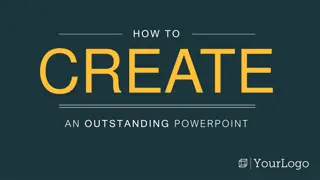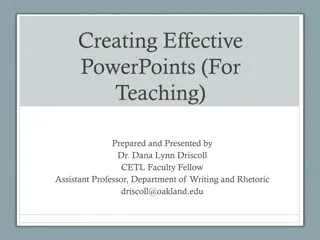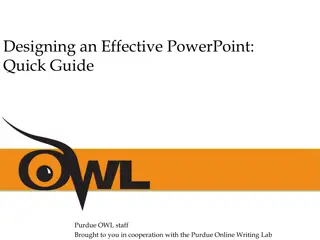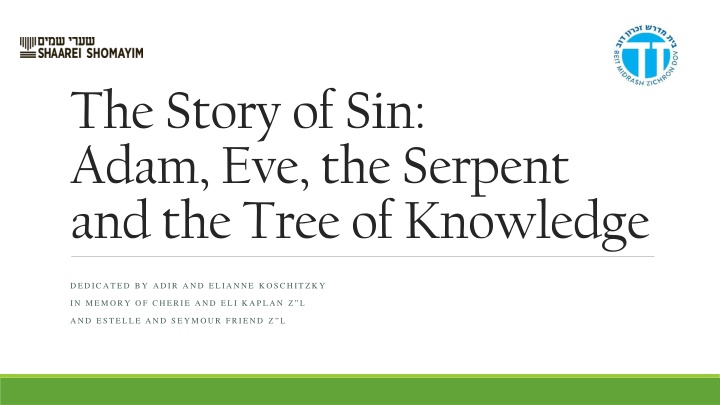
Adam, Eve, and the Tree of Knowledge - The Story of Sin
Explore the biblical narrative of Adam, Eve, the serpent, and the Tree of Knowledge through the creation of man in the Garden of Eden, the instructions given to Adam, the creation of Eve as a helper, and the temptation and fall of humanity as Eve succumbs to the serpent's deceit. Witness the consequences of defying the divine command and gaining knowledge of good and evil.
Download Presentation

Please find below an Image/Link to download the presentation.
The content on the website is provided AS IS for your information and personal use only. It may not be sold, licensed, or shared on other websites without obtaining consent from the author. If you encounter any issues during the download, it is possible that the publisher has removed the file from their server.
You are allowed to download the files provided on this website for personal or commercial use, subject to the condition that they are used lawfully. All files are the property of their respective owners.
The content on the website is provided AS IS for your information and personal use only. It may not be sold, licensed, or shared on other websites without obtaining consent from the author.
E N D
Presentation Transcript
The Story of Sin: Adam, Eve, the Serpent and the Tree of Knowledge DEDICATED BY ADIR AND ELIANNE KOSCHITZKY IN MEMORY OF CHERIE AND ELI KAPLAN Z L AND ESTELLE AND SEYMOUR FRIEND Z L
Structure of the Narrative Bereishit 2:4-2:7- Vegetation Sprouts, Man is created from the ground with, and Hashem blows a soul into him Bereishit 2:8- 2:14- Hashem plants a Garden in Eden . . And the Lord God planted a garden eastward in Eden; and there He put the man whom He had formed. And out of the ground the Lord God made to grow every tree that is pleasant to the sight, and good for food; the tree of life also in the midstof the garden, and the tree of the knowledge of good and evil
Structure of the Narrative: The Instructions 2:15-2:17- Adam is placed in the Garden of Eden to work it and to guard it . He is given instructions 1) You can eat from all the trees of the garden. 2) But you must not eat from the tree of knowledge of good and evil . . . . And the Lord God took the man, and put him into the garden of Eden to till it and to keep it. And the Lord God commanded the man, saying, Of every tree of the garden thou mayst freely eat: but of the tree of the knowledge of good and evil, thou shalt not eat of it: for on the day that thou eatest of it thou shalt surely die.
Structure of the Narrative: Adam needs a helper . 2:18- 2:25- A Wife is created for Adam . . . . And the man said, This is now bone of my bones, and flesh of my flesh: she shall be called Woman, because she was taken out of Man. That is why a man leaves his father and his mother, and cleaves to his wife: and they become one flesh. And they were both naked, the man and his wife, and they felt no shame. Hashem creates a wife for Adam, after Adam names all of the other animals and notices he lacks a helper The man and the women are naked but not embarrased
Searching for the Evil Serpent
Eve and The Serpent Bereishit 3:1-6 (Koren Translation) . . . . . . Now the serpent was craftier than all the beasts of the field which the Lord God had made. And he said to the woman, Has God said, You shall not eat of any tree of the garden? And the woman said to the serpent, We may eat of the fruit of the trees of the garden: but of the fruit of the tree which is in the midst of the garden, God has said, You shall not eat of it, neither shall you touch it, lest you die. And the serpent said to the woman, You shall not surely die: for God knows that on the day you eat of it, then your eyes shall be opened, and you shall be as gods, knowing good and evil. And when the woman saw that the tree was good for food, and that it was a delight to the eyes, and a tree to be desired to make one wise, she took of its fruit, and did eat, and gave also to her husband with her; and he did eat. And the eyes of them both were opened, and they knew that they were naked; and they sewed fig leaves together, and made themselves loincloths.
Questions: Searching For the Serpent 1. Who was the Serpent? The Serpent is cunning , talks, and seems to have an agenda. a. b. On the other hand it s described as of the beasts of the field . c. It s punishment for seducing Adam and Eve to sin is: You shall crawl on your belly and eat dust - Even though G-d said not to eat from all of the trees of the garden . What s the conclusion of the statement? 2. a. G-d didn t say don t eat from all the trees of the garden! 3. Eve s Response 1) We can eat from the fruit of the trees of the garden 2) But we can t eat from the fruit of the tree in the midst of the garden or touch it lest we die. a. Why does she call it b. b. Why did she add that she couldn t touch it?
Questions: Searching For the Serpent 1. - Wasn t the Serpent right? ... You won t die- Adam and Even didn t die! You re eyes will be opened- There eyes were opened! See 3:7 They did become like G-d, knowing Good and Evil! See 3:22 " a. b. c. They eyes were opened and they knew they were naked Hashem, the Lord said, the Man has become like one of us, to know good and evil 2. If he was right, why is the Serpent Punished? .
Eve faltersand brings Adam along with her . She sees the tree is 1) good to eat 2) a temptation for the eyes 3) desirable to become enlightened- 1. What is the significance of these three descriptions? 2. She gives it to Adam- what is his role in this sin?
Searching For the Serpent Review- 3 Basic Questions What type of snake was the serpent? Staement #1 Even though Hashem Said don t eat from all the trees of the garden .What does this mean? Statement #2- No you will not die, for Elokim knows that the day you eat from it your eyes will open and you will be like Elokim- knowing good and evil .Was this a lie or the truth?
Who is the Serpent? There are Three Approaches expressed in the Commentators regarding the identity of the : 1. The is the - the evil drive inside of us. 2. The was a snake with miraculous powers. 3. The was a normal snake.
The Serpent as the Internal Evil Force Zohar on Bereishit1:35 . And the Serpent was cunning: This is the Evil Inclination, this is the Angel of Death. Since the serpent was the angel of death, it caused death for the whole world. Seforno on Bereshit3:1 " " , . The Serpent: He is Satan, He is the Evil Inclination , Much Damage but barely visible in this way Hashem called the evil inclination that causes sin the serpent , in that it is similar to a serpent, in that it s productivity toward the world is very limited, but it causes a lot of damage with a small appearance. . " , " . , ,
The Serpent as the Internal Evil Force Seforno Cont d , . , , , They have already stated z l, that Samael rode on it, this means that the forces of temptation which cause sin do so with the help of the imagination which brings with it fantasies of physical pleasure, which veer from the path of perfection intended by G-d. For the imaginative faculty, with the fantasies of pleasures it brings are common to the active physical forces and they deter G-d s will and intern, when the power of the intellect doesn t stand up to them and object to them.
... The Goal of the is to portray G-d as the enemy Rabbi Yaakov Mecklenburg- (Ktav V Hakabbalah ibid.) translates as Anger G-d has causes greater anger by saying you shouldn t eat. For by withholding you from eating from the fruit of the forest, the soul will feel pain, and anguish. For we have constantly stand on guard from eating beautiful, and good looking fruit such as these Rabbi Yitzchak Arama (15thcentury Spain), Sefer HaIkkarim 4:28 , I am very angry that Hashem told you not to eat from all of the trees, but only from specific trees, because it would be better for you otherwise
Tricks of the The Cunning of the serpent is evident in his words: You can t eat from any of the trees- Rabbi Chaim Ibn Attar- Even though he withheld only one from you .it s the best one! He might as well have withheld everything from you! The Goal isn t just to convince to enjoy the forbidden, but to not enjoy what is permissible to us Use of the imagination- The doesn t complete the sentence it s up to our imagination to finish Even though Hashem said we can t.. It s worth it It won t be bad anyway Just this once .
Tricks of the How do we relate to Hashem? Throughout the story of Adam and Eve, the term used to refer to G-d is that of opposed to in the 1st , where name used is just Rashi- quotes " who explain as follows - refers to - Divine Attribute of Mercy Rabbi Soloveichik-Personal, Imminent G-d - refers to - Attribute of Judgement Rabbi Soloveichik-Global, Distant G-d We always have to balance both conceptions as " " . " " Isn t it interesting that the only uses .
The Man-Like Snake Rabbi Avraham Ibn Ezra on Rabbi Avraham Ibn Ezra on Bereishit , Bereishit3:1 3:1 . , , . I believe that the words are as they sound. The serpent spoke, walked upright, and Hashem who imparted man with knowledge, placed it [in the snake]. The verse says more cunning than the beasts of the field, but not like man. Rabbi Yitzchak Rabbi Yitzchak Aramah Aramah( (Akeidat AkeidatYitzchak Gate Yitzchak Gate 9 9) ) . The verse testifies this animal by nature was more cunning than the other animals, as if it was a mediator between them and the human race in terms of knowledge So then what separates between the Snake and the Animal
Rabbi Hirsch zl-Animal Wisdom The opposition to the animal life is the probing stone and the cliff on which human morality is tried or failed. It was animal wisdom that drew the first man from his duty; it is still the same animal wisdom today that serves as a midwife to every sin. The story of the first misstep is the story of all aberrations. The animal is really -The instinct resides in it, and this instinct is the voice of God, the will of God for it. What it does according to this divine providence prevailing in it - and it does not do anything else, it cannot do anything else - is good, and everything from which this instinct holds it back is evil. The animal does not go wrong, it only has one nature that it can follow, should follow.
Rabbi Hirsch zl-Animal Wisdom Not so the Human. He should choose what is good out of free choice and a sense of duty and avoid evil; He should also do justice to his sensual nature, not out of sensory stimulus, but out of a sense of duty. Even its most sensual enjoyment should be free moral deed, it should never and nowhere and in no way be an animal. That is why he has the sensual and the divine in him; it must often resist the good of its sensuality, the evil that often appears charming to him, so that for the sake of his high divine calling, with the free energy of his divine nature, despite his sensuality and never out of sensuality, he may practice the good and avoid the evil.
Rabbi Hirsch zl-Animal Wisdom That is why the voice of God does not speak in him, but to him, what is good and bad, and this voice of God speaking to him finds contradiction in the sensuality that becomes loud in him, as soon as this sensuality expresses itself independently, unaffected and unguided by his divine nature. The divine voice breathed into man, the conscience, as its messenger which recognized shame - only admonishes man in general to be good and to avoid evil; but what is good and what is bad for man can only be heard from God's mouth.
Summarizing Rabbi Hirsch zl - Distinction between Good and Evil in the thought of the Animal Mind and Good and Evil in the Human Mind. Animals- Good=Instinct- Whatever drive G-d bestows upon the animal is the good for the animal. Humans- Good= Duty- Balance between sensual drive and the divine Role of the Divine Voice: The Divine Voice Speaks within the animal The Divine Voice Speaks to the Human The Role of the Conscience- our inner voice (breath of G-d) is tells us to do good but only G-d determines what is good
Rabbi Hirsch zl-Animal Wisdom It is incomprehensible to the animal, even to the cleverest, how a person insensitively bypasses the most beautiful, charming, best enjoyment. - and even if God said so" this " , beginning of the speech already shows us humans in conversation with animals. Man had already emphasized the prohibition of God as a reason for non-enjoyment. "And what if God said it now ?! Do you therefore have to follow? Isn't the instinct in you God's voice? If the enjoyment is bad for you, why did he give the enjoyment the stimulus and you the drive, so he does not have you clearly said yourself that this pleasure and you are there for each other? Isn't this voice his earlier, clearer voice? First God creates the pleasures and you with the desire for them, and then - should he forbid you everything?
... Rabbi Hirsch z l- The Serpent s argument was that our inner drives are equally G-d s voice. If not why should G-d have gives us these drives? Just as G-d commanded you not to eat from the tree, he also commanded you to eat from the tree because look at it- you want it The flaw in Eve s thinking is that for humans, our drives are not the voice of G-d Rather, we acknowledge we are complex being, made up of the sensual and divine. We need to use both the divine command and innate sense of right and wrong so that even when we satisfy our sensual drives, we do so in fulfilling our duty to G-d and to the world
Abravanel-the was just a snake! Don Isaac Abravanel Bereishit Chapter 3 but the matter was that she saw the serpent rising in the tree of knowledge and eating its fruit time and time again. What and the woman thought of it and researched herself as such she would talk to the serpent and that he owned the tree and ate of its fruit he would tell her not to die mortal. .
Abravanel-the was just a snake! Don Isaac Abravanel Bereishit Chapter 3 Therefore my opinion on the matter of the serpent and this narrative I will tell you here which is the basis of this section and its truth and that the serpent did not speak at all to the woman and not the woman to him because he is not a man of words and for this the verse did not say in its regard that Hashem opened the mouth of the serpent as it said that Hashem opened the mouth of the donkey of Bilaam, there because the donkey literally spoke and it was miraculous, but regarding the serpent it doesn t say this at all for it didn t speak at all either naturally, or miraculously.
Abravanel-the was just a snake! According to the Abravanel s read, the snake didn t say anything. It simply acted in a way which made Chavah question everything she believed. Doubt- Sin often comes from a place of doubt. When we watch others sin we question our systems of ethics and morality. In the Abravanel s view, what undergirds sin s is a lack of confidence in the legitimacy of the divine command.
To Know Good and Evil UNDERSTANDING THE TREE OF KNOWLEDGE
What effect did Eating from the Tree of knowledge have? Evidence from the Text 2:18- Hashem: For the Day you eat from it you will surely die 3:6- Eve sees the tree is good to eat , desirable for the eyes , attractive to become enlightened . 3:7- After eating from the tree, the eyes of Adam and Eve are opened and they know they are naked. 3:22- Hashem: Behold the man has become like us, to know good and evil, now- lest he send his hand and take from the tree of life and eat and live forever . 2 Directions: Cognitive Approach Sensual Approach
Guide for the Perplexed 1:2-Punished with Knowledge? Friedlander Translation Some years ago a learned man asked me a question of great importance; the problem and the solution which we gave in our reply deserve the closest attention. Before, however, entering upon this problem and its solution I must premise that every Hebrew knows that the term Elokim is a homonym, and denotes G-d, angels, judges, and the rulers of countries, and that Onkelos the proselyte explained it in the true and correct manner by taking Elokim in the sentence, "and ye shall be like Elokim" (Gen. 3:5) in the last-mentioned meaning, and rendering the sentence "and ye shall be like princes." Having pointed out the homonymity of the term "Elokim" we return to the question under consideration.
Guide for the Perplexed 1:2-Punished with Knowledge? "It would at first sight," said the objector, "appear from Scripture that man was originally intended to be perfectly equal to the rest of the animal creation, which is not endowed with intellect, reason, or power of distinguishing between good and evil: but that Adam's disobedience to the command of God procured him that great perfection which is the peculiarity of man, viz., the power of distinguishing between good and evil-the noblest of all the facultiesof our nature, the essential characteristic of the human race. It thus appears strange that the punishment for rebelliousness should be the means of elevating man to a pinnacle of perfection to which he had not attained previously. This is equivalent to saying that a certain man was rebellious and extremely wicked, wherefore his nature was changed for the better, and he was made to shine as a star in the heavens." Such was the purport and subject of the question, though not in the exact words of the inquirer.
Guide for the Perplexed 1:2-Punished with Knowledge? Summary of the Question Eating from the Tree of Knowledge imparted mankind with the ability to discern between good and evil Before eating from the Tree, mankind didn t possess this ability. The ability to discern between good and evil is the defining quality of humanity and what distinguishes humans from animals. Violating the word of G-d therefore resulted in humanity attaining their most powerful attribute.
Guide for the Perplexed 1:2-Punished with Knowledge? Rambam begins his answer: Now mark our reply, which was as follows:--"You appear to have studied the matter superficially, and nevertheless you imagine that you can understand a book which has been the guide of past and present generations, when you for a moment withdraw from your lusts and appetites, and glance over its contents as if you were reading a historical work or some poetical composition. Collect your thoughts and examine the matter carefully, for it is not to be understood as you at first sight think, but as you will find after due deliberation; First the Rambam rebukes the questioner for reading the Torah superficially
Guide for the Perplexed 1:2-Punished with Knowledge? Namely, the intellect which was granted to man as the highest endowment, was bestowed on him before his disobedience. With reference to this gift the Bible states that "man was created in the form and likeness of God." On account of this gift of intellect man was addressed by God, and received His commandments, as it is said: "And the Lord God commanded Adam" (Gen. 2:16)--for no commandments are given to the brute creation or to those who are devoid of understanding. Through the intellect man distinguishes between the true and the false. This faculty Adam possessed perfectly and completely. Man was created with a perfect intellect which is described as Tzelem Elokim . Proof- How can Adam have been given a command if he had no intellect? This intellectual capacity enabled Adam to differentiate between the true and the false.
Right Vs. True The right and the wrong are terms employed in the science of apparent truths (morals), not in that of necessary truths, as, e.g., it is not correct to say, in reference to the proposition "the heavens are spherical," it is "good" or to declare the assertion that "the earth is flat" to be "bad": but we say of the one it is true, of the other it is false. Similarly our language expresses the idea of true and false by the terms emet and sheker, of the morally right and the morally wrong, by tob and ra . Thus it is the function of the intellect to discriminate between the true and the false--a distinction which is applicable to all objects of intellectual perception.
Right Vs. True Before eating- Adam and Eve knew and , knowledge attainable throughknowledge , what the Rambam describes as " " After eating- Adam and Even knew good and evil - These two terms are a but unclear Rabbi Netanel Weiderblank (Illuminating Jewish Thought pg. 46-47) brings two different interpretations 1. Moral Truth- By eating from the tree, Adam and Eve knew what was morally repugnant even if it wasn t false 2. Aesthetic Beauty- By eating from the tree, Adam and Even knew what was ugly or unpleasant - propriety vs. impropriety
The Sin of Eating From the Tree-The Wrong Lens When Adam was yet in a state of innocence, and was guided solely by reflection and reason--on account of which it is said: "Thou hast made him (man) little lower than the angels" (Ps. 8:6)--he was not at all able to follow or to understand the principles of apparent truths ; the most manifest impropriety, viz., to appear in a state of nudity, was nothing unbecoming according to his idea: he could not comprehend why it should be so. After man's disobedience, however, when he began to give way to desires which had their source in his imagination and to the gratification of his bodily appetites, as it is said, "And the wife saw that the tree was good for food and delightful to the eyes" (Gen. 3:6), he was punished by the loss of part of that intellectual faculty which he had previously possessed.
The Sin of Eating From the Tree-The Wrong Lens According to the Rambam, the sin isn t just the act of eating but the focus on desires which had their source in his imagination and to the gratification of his bodily appetites . Adam and Eve chose to see the world in this way This is the meaning of Eve gazing at the tree and finding it good to eat etc. Apparently, Adam and Eve had such appetite previously. However, in their innocence, they had no drive to focus on them. That changed when they ate from the tree.
The Allure of the Aesthetic He therefore transgressed a command with which he had been charged on the score of his reason; and having obtained a knowledge of the apparent truths, he was wholly absorbed in the study of what is proper and what improper. Then he fully understood the magnitude of the loss he had sustained, what he had forfeited, and in what situation he was thereby placed. Hence we read, "And ye shall be like elokim (nobility), knowing good and evil," and not "knowing" or "discerning the true and the false": while in necessary truths we can only apply the words "true and false," not "good and evil.
The Punishment-The Ugly Pursuit of Pleasure In accordance with this interpretation, our text suggests that Adam, as he altered his intention and directed his thoughts to the acquisition of what he was forbidden, he was banished from Paradise: this was his punishment; it was measure for measure. At first he had the privilege of tasting pleasure and happiness, and of enjoying repose and security; but as his appetites grew stronger, and he followed his desires and impulses, (as we have already stated above), and partook of the food he was forbidden to taste, he was deprived of everything, was doomed to subsist on the meanest kind of food, such as he never tasted before, and this even only afterexertion and labour,
The Punishment-The Ugly Pursuit of Pleasure As it is said, "Thorns and thistles shall grow up for thee" (Gen. 3:18), "By the sweat of thy brow," etc., and in explanation of this the text continues, "And the Lord God drove him from the Garden of Eden, to till the ground whence he was taken." He was now with respect to food and many other requirements brought to the level of the lower animals: comp., "Thou shalt eat the grass of the field" (Gen. 3:18). Reflecting on his condition, the Psalmist says, "Adam unable to dwell in dignity, was brought to the level of the dumb beast" (Ps. 49:13)."May the Almighty be praised, whose design and wisdom cannot be fathomed. For the Rambam, the irony of the story is that the desire for the aesthetic for that which is beautiful and pleasant ultimately makes achieving those aims infinitely more difficult.
Summary of Rambam Q. Why did Hashem created Adam and Eve without the ability to discern between good and evil? A. Good and Evil in this Context means: Pleasant/Unpleasant- Comfortable/Uncomortable Eating from the Tree of Knowledge caused Adam and Eve to pay attention to these concerns and not only to truth and falsehood. While knowing what is pleasant and unpleasant isn t bad, focusing and viewing life through that prism is unhealthy.
Problem-Rambam Teshuva 5:1 (translation Phillip Birnbaum) , , . , Free will is granted to every human being. If a man wants to follow the good path and be good, he has the power to do so; if he wants to follow the evil way and be wicked, he is free to do so. It is written: "Indeed, man has become like one of us, knowing good and evil" (Genesis 3:22). That is to say, the human species is unique in the world, there being no other species like it in this respect, namely that man by himself, using his own intelligence and reason, knows what is good and what is evil, without anyone preventing him from doing good or evil as he pleases; in view of this, "he will perhaps put forth his hand and take also from the tree of life "
The RambansApproach-=Will Ramban on Bereishit Chapter 2 (translation David Strauss) , . , . , , : ) , ( ) , , , , . " , , , , ) " " , " ( ( The proper interpretation appears to me to be that man's original nature was such that he did whatever was proper for him to do naturally, just as the heavens and all their hosts do, "faithful workers whose work is truth, and who do not change from their prescribed course," and in whose deeds there is no love or hatred. Now it was the fruit of this tree that gave rise to will and desire, that those who ate it should choose a thing or its opposite, for good or for evil. This is why it was called the Tree of Knowledge of good and evil, for 'knowledge' in our language is used to express will...
The RambansApproach-=Will , , : , . , , Now at that time sexual intercourse between Adam and his wife was not a matter of desire; instead, at the time of begetting offspring they came together and propagated. Therefore, all the limbs were, in their eyes, as the face and hands, and they were not ashamed of them. But after he ate of the fruit of the Tree of Knowledge, he possessed the power of choice; he could now willingly do evil or good to himself or to others. This, on the one hand, is a godlike attribute; but as far as man is concerned, it is bad because through it, he has a will and desire. (Ramban, Commentary to Bereishit 2:9)
When Will Became Internal Nefesh Hachaim 1:6- Rabbi Chaim of Volozhin (translated by Leonard Moskowitz) . " . . " . . . . : " . . . ' " And the situation is that before the sin, he certainly had the absolute freedom of choice to incline himself towards anything he desired, to do good or the opposite (heaven forefend), for this was the primary intention of the entirety of creation, and also [we can confirm that this is so], for later he sinned. However, it s not that the matter of his choice was the result of the powers of evil being an internal part of him, for he was a completely righteous Heb.: ya- shar person, comprised only of the structures and processes of the powers of holiness alone, and all of his interactions were totally righteous, holy and refined, absolute good, without any admixture or inclination to the opposite side in any way; the powers of evil stood off to the side and were independent, external to him. And he had the freedom of choice to engage with the powers of evil (heaven forefend), just as man has the freedom of choice to enter in the midst of the fire.
When Will Became Internal . . . " . Before when the other side desired to cause him to sin, the serpent had to come from the outside to seduce. It s not like it is now, that the urge that seduces the person is within the person himself, and makes it appear to the person as if he himself, he is the one who desires and lusts to do the iniquity, and not that another outside himself seduces him. '' . . . . ' . '' . And when he sins because he is lured by the other side s seduction, then the powers of evil are actually mixed into him, and so too within the worlds. This is the Tree of Knowing Good and Evil that they, the good and the evil, became attached and mixed within him and the worlds, one actually within the other, because the definition of knowledge Heb.: da-aht is attachment Heb.: hit-khab-root, as is known.
The Choice To truly Choose It follows from the Ramban, that by eating from the tree of knowledge, Adam wanted True Free Will- Namely, 1) The Desire to Experience the Result of One Alternative, while at the same time 2) retaining the knowledge that the other alternative is a better choice. The Snake enticed Adam through telling him that having true Free Will, Adam would be more God Like- Hashem, also has Will This Begs the question- Was Adam s decision really so bad and if so why?
Rambanon Devarim30:6 , ) ( - . ' ( ) , , , . It appears from these verses, that from the time of creation, humans had the authority to do according to their will, to be righteous or wicked, such was so for the entire period of the Torah, so they should merit when they choose good, and be punished when they desire evil.
Rambanon Devarim30:6 . . , , ) : , . , , ( But in the days of the Messiah, the choice to go good will be natural, their hearts will not desire that which is inappropriate and they will not want it at all. That is the circumcision mentioned here. For desire and temptation are the foreskin of the heart, and circumcising the heart means that it shouldn t desire or be tempted. Man at that time will be as he was before the sin of Adam the first, that he naturally did what was appropriate to do, and he didn t have the desire for a thing or its opposite as I explained in the Book of Bereishit.

